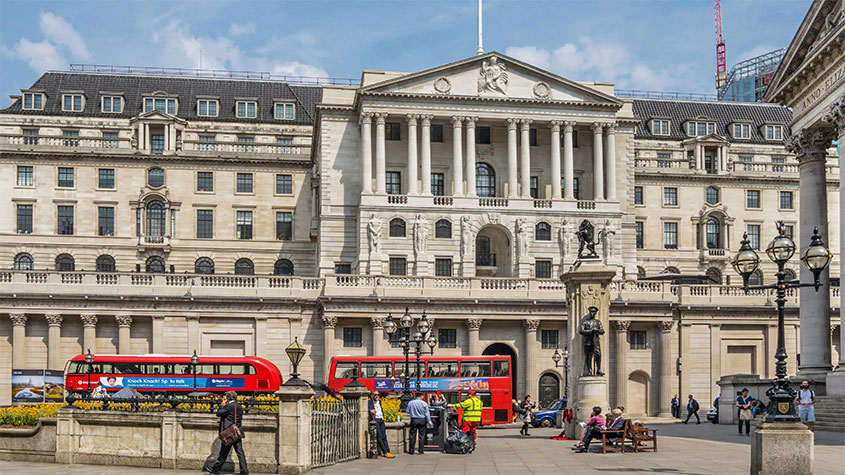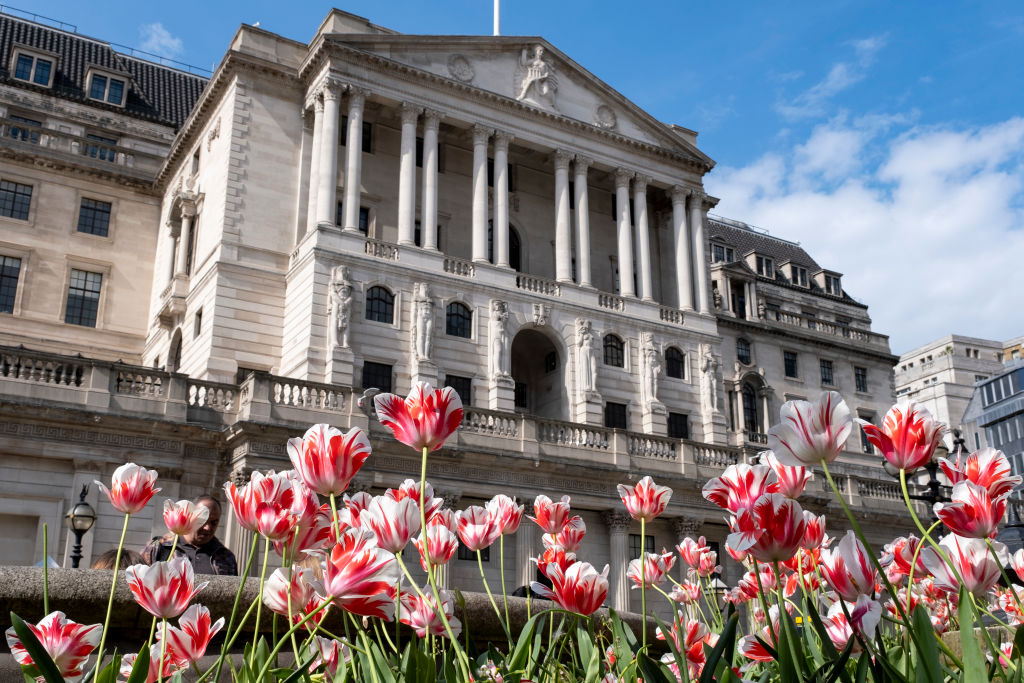Bank of England spends £65bn to “restore orderly market conditions”
The Bank of England has said it will spend £65bn buying bonds to stabilise the financial markets after the government’s mini-Budget. Saloni Sardana explains what’s happening.


Get the latest financial news, insights and expert analysis from our award-winning MoneyWeek team, to help you understand what really matters when it comes to your finances.
You are now subscribed
Your newsletter sign-up was successful
Want to add more newsletters?

Twice daily
MoneyWeek
Get the latest financial news, insights and expert analysis from our award-winning MoneyWeek team, to help you understand what really matters when it comes to your finances.

Four times a week
Look After My Bills
Sign up to our free money-saving newsletter, filled with the latest news and expert advice to help you find the best tips and deals for managing your bills. Start saving today!
Sterling fell for a third day in a row on Wednesday, despite emergency action from the Bank of England to calm the turmoil in government debt markets.
UK bond markets sold off in the aftermath of Friday’s mini-Budget, raising the odds of an emergency interest rate rise.
Earlier this week sterling fell to its lowest level against the dollar in decades – as low as $1.0384 – as chancellor Kwasi Kwarteng announced a government growth plan that included new and previously announced measures. These included an Energy Price Guarantee, removal of the higher rate of income tax and a number of other tax cuts.
MoneyWeek
Subscribe to MoneyWeek today and get your first six magazine issues absolutely FREE

Sign up to Money Morning
Don't miss the latest investment and personal finances news, market analysis, plus money-saving tips with our free twice-daily newsletter
Don't miss the latest investment and personal finances news, market analysis, plus money-saving tips with our free twice-daily newsletter
What emergency action did the Bank of England announce?
The Bank of England said it will intervene in bond markets and attempt to prop them up. It is going to spend up to £65bn – £5bn every weekday until 14 October. It is, it said, ready to purchase “conventional gilts with a residual maturity of more than 20 years in the secondary market, initially at a rate of up to £5bn per auction. These parameters will be kept under review in light of prevailing market conditions.”
“This repricing… is particularly affecting long-dated UK government debt. Were dysfunction in this market to continue or worsen, there would be a material risk to UK financial stability. This would lead to an unwarranted tightening of financing conditions and a reduction of the flow of credit to the real economy,” the Bank of England said.
As part of its gilt market operation the BoE announced:
- It will carry out temporary purchases of long-dated UK government bonds starting from 28 September.
- The intervention is expected to be “strictly time limited” with auctions taking place from today until 28 October. This is intended to address a “specific problem” in the long-dated gilt market.
- While the Monetary Policy Committee’s annual target of an £80bn stock reduction is unaffected the central has postponed the beginning of gilt sale operations that were due to commence early October. This has now been pushed to 31 October.
The mini-Budget sparked heavy selling in gilts with investors dumping both short-term and long-term bonds. 30-year gilts spiked by 45 basis points yesterday – a substantial rise for a single day.
The sell-off was also not helped by a separate announcement from the UK Debt Management Office last week saying it is raising the amount of gilts it plans to sell by £62.4bn, taking the total planned sales to £193.9bn in 2022-2023.
Much of the UK’s tax cuts are expected to be funded from selling gilts (AKA borrowing), putting the UK in an unfavourable fiscal position.
"The cost of the newly-announced measures is reported to be £160bn over five years but, with the cost of the energy price guarantee highly dependent on wholesale energy prices, investors are worried the Treasury has effectively committed to open-ended borrowing,” says Chris Turner of ING Group.
Why is the Bank of England targeting long-term bonds?
Financial markets rely on buying and selling government bonds to manage risk over the long run, explains Sky News’ Ed Conway. “This is part of the plumbing which allows money to flow from savers to borrowers”.
For the pensions industry it is even more important because they typically rely on longer-dated bonds that have at least 20 years to maturity.
Pension funds have come under pressure to sell bonds, according to Bloomberg.
“Fund managers running billions for pension funds faced collateral calls on strategies meant to give them exposure to long-dated assets to help match obligations that can extend decades. The so-called liability-driven investment, or LDI, funds were forced to post more collateral after receiving margin calls when gilt prices collapsed,” said Bloomberg.
So the intervention makes it less likely that pension funds will go bust.
“Had pension funds gone bust as a result of rising yields the UK would be facing nothing short of a financial armageddon. Therefore, the Bank's actions minimise the risk of a full-blown Sterling asset crisis,” says Pound Sterling live.
However, when a central bank buys bonds, it is typically perceived as a negative for a currency as it caps yields.
It can also dampen investor sentiment as it is seen as a last resort or desperate measure by the central bank.
The probability of pound to dollar parity also keeps rising and has reached at least 60% according to Bloomberg.
This has more than doubled since Friday, when Bloomberg said the probability was 26%.
"It’s hard to believe economists are talking about pound parity with the dollar. This will severely impact importers, and we buy in a lot more than we export,” says Samuel Mather-Holgate of advisory firm, Mather & Murray Financial.
The fall in sterling also reflects concerns about the health of the UK economy and the increasingly high chance the UK will fall into recession later this year as inflation spirals out of control and energy prices remain high.
So it remains to be seen whether the central bank’s intervention will help push sterling higher or not. The chancellor is also due to unveil more fiscal plans on 23 November, so the pound may likely still stay depressed until greater clarity on how Kwarteng’s plans will affect the UK.
The Bank of England has not ruled out an emergency interest rate rise, saying: “The MPC will not hesitate to change interest rates by as much as needed to return inflation to the 2% target sustainably in the medium term”.
The FT reports that “derivatives markets are pricing in a rise of more than 0.5 percentage points in a week’s time and an increase of nearly 1.5 percentage points by the November meeting,”
The Bank of England raised interest rates by 0.5 percentage points earlier this month to the highest level since 2008, taking the base rate to 2.25%.
How will a weaker pound affect you?
With oil and several other key commodities and imports priced in dollars, one of the biggest concerns is that a weak sterling will worsen inflation. Weaker sterling and a higher dollar makes the cost of imports more expensive and will raise prices at a time when all Britons are grappling with a cost of living crisis.
Philip Dragoumis, owner of London-based Thera Wealth Manager, echoes this view: “If foreign investors lose confidence in the country, its government and economy, which is happening at scale, sterling could fall much further and the fallout will be devastating. This will keep inflation higher for longer and growth lower.”
Sarah Coles, senior personal finance analyst at Hargreaves Lansdown, said: “The plunging pound is effectively picking our pockets and making us poorer. The market reaction to the tax and spending plans announced on Friday will have a profound impact on everything from the cost of filling up the car and supermarket prices to debt repayments and the value of our savings.
Get the latest financial news, insights and expert analysis from our award-winning MoneyWeek team, to help you understand what really matters when it comes to your finances.
Saloni is a web writer for MoneyWeek focusing on personal finance and global financial markets. Her work has appeared in FTAdviser (part of the Financial Times), Business Insider and City A.M, among other publications. She holds a masters in international journalism from City, University of London.
Follow her on Twitter at @sardana_saloni
-
 Should you buy an active ETF?
Should you buy an active ETF?ETFs are often mischaracterised as passive products, but they can be a convenient way to add active management to your portfolio
-
 Power up your pension before 5 April – easy ways to save before the tax year end
Power up your pension before 5 April – easy ways to save before the tax year endWith the end of the tax year looming, pension savers currently have a window to review and maximise what’s going into their retirement funds – we look at how
-
 Why Scotland's proposed government bonds are a terrible investment
Why Scotland's proposed government bonds are a terrible investmentOpinion Politicians in Scotland pushing for “kilts” think it will strengthen the case for independence and boost financial credibility. It's more likely to backfire
-
 How have central banks evolved in the last century – and are they still fit for purpose?
How have central banks evolved in the last century – and are they still fit for purpose?The rise to power and dominance of the central banks has been a key theme in MoneyWeek in its 25 years. Has their rule been benign?
-
 UK to have highest inflation among advanced economies this year and next, says IMF
UK to have highest inflation among advanced economies this year and next, says IMFThe International Monetary Fund (IMF) says it expects inflation to remain high in the UK, while lowering economic growth forecasts for 2026.
-
 Is Britain heading for a big debt crisis?
Is Britain heading for a big debt crisis?Opinion Things are not yet as bad as some reports have claimed. But they sure aren’t rosy either, says Julian Jessop
-
 'Britain is on the road to nowhere under Labour'
'Britain is on the road to nowhere under Labour'Opinion Britain's economy will shake off its torpor and grow robustly, but not under Keir Starmer's leadership, says Max King
-
 'Governments are launching an assault on the independence of central banks'
'Governments are launching an assault on the independence of central banks'Opinion Say goodbye to the era of central bank orthodoxy and hello to the new era of central bank dependency, says Jeremy McKeown
-
 Why investors can no longer trust traditional statistical indicators
Why investors can no longer trust traditional statistical indicatorsOpinion The statistical indicators and data investors have relied on for decades are no longer fit for purpose. It's time to move on, says Helen Thomas
-
 Live: Bank of England holds UK interest rates at 4.5%
Live: Bank of England holds UK interest rates at 4.5%The Bank of England voted to hold UK interest rates at their current level of 4.5% in March, as widely anticipated, after inflation rose to 3% in January
